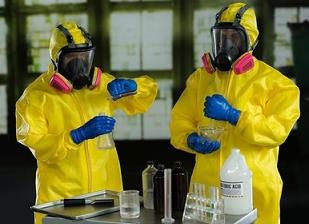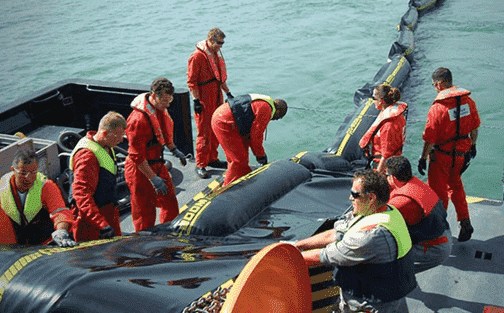COURSE OVERVIEW
HE1941 : Industrial Hygiene Certification Program BOHS-M505: Control of Hazardous Substances (Accredited by the British Occupational Hygiene Society - BOHS)

OVERVIEW
| COURSE TITLE | : | HE1941 : Industrial Hygiene Certification Program BOHS-M505: Control of Hazardous Substances (Accredited by the British Occupational Hygiene Society - BOHS) |
| COURSE DATE | : | Feb 16 - Feb 20 2025 |
| DURATION | : | 5 Days |
| INSTRUCTOR | : | Mr. Peter Jacobs |
| VENUE | : | Doha, Qatar |
| COURSE FEE | : | $ 8000 |
| Register For Course | ||
OTHER SCHEDULED DATES
| Date | : | Feb 16 - Feb 20 2025 (5 Days) | Location | : | Doha, Qatar | Classroom Fee (US$) | : | $ 8800 | Course Info |
| Date | : | May 04 - May 08 2025 (5 Days) | Location | : | Al Khobar, KSA | Classroom Fee (US$) | : | $ 7500 | Course Info |
| Date | : | Jun 14 - Jun 18 2025 (5 Days) | Location | : | Kuwait City, Kuwait | Classroom Fee (US$) | : | $ 7500 | Course Info |
| Date | : | Aug 31 - Sep 04 2025 (5 Days) | Location | : | Istanbul, Turkey | Classroom Fee (US$) | : | $ 8000 | Course Info |
| Date | : | Oct 05 - Oct 09 2025 (5 Days) | Location | : | Dubai, UAE | Classroom Fee (US$) | : | $ 7500 | Course Info |
| Date | : | Dec 08 - Dec 12 2025 (5 Days) | Location | : | Abu Dhabi, UAE | Classroom Fee (US$) | : | $ 7500 | Course Info |
Course Description
This practical and highly-interactive course includes various practical sessions and exercises. Theory learnt will be applied using our state-of-the-art simulators.
This course aims to provide candidates with an understanding of how exposure to hazardous substances arises and where they may occur, in the workplace and introduce methods and technologies which are available to control exposures and help reduce risks to health.
On completing this course successfully, participants will be able to: -
· Describe how airborne contaminants are generated by industrial processes, how this would impact on the control strategy, and how control solutions can be optimised
· Recognise the range of approaches to risk reduction embodied in the hierarchy of control and select appropriate strategies for implementation
· Describe the meaning of “adequate control” in relation to personal exposures
· Discuss the importance of design considerations in terms of the workplace, process, and plant, as a means of reducing occupational exposures
· Describe the principal elements of a local exhaust ventilation system, give examples of typical installations, and know how to conduct the necessary measurements to assess whether a local exhaust ventilation system is effective and operating to the design specification
· Recognise the limitations of local exhaust hoods and enclosures and the means to optimise their effectiveness
· Describe how personal protective equipment programmes may be used in an effective manner
· Recognise the impact that control measures may have on other workplace hazards and understand the need to take a holistic approach to the design of control solutions
This course is designed to provide participants with a detailed and up-to-date overview of BOHS-M505: Control of Hazardous Substances. It covers the range of properties of airborne contaminants and the potential hazards they may present; develop an understanding of the approach to controlling exposure problems and how to select appropriate control strategies; the workplace control principles covering hierarchy of control, achieving effective control and the role of assessment (by all routes); the practical applications of the hierarchy of control and identifying effective control strategies, adopting the principles of reasonable practicability.
During this interactive course, participants will learn the design of equipment and workplace and apply prevention, elimination and substitution; the general ventilation systems and local exhaust ventilation (LEV) and apply proper measurement and testing of LEV systems; the personal protective equipment, respiratory protective equipment, chemical protective clothing (CPC), gloves and dermal care; and the various administrative elements.
The course will require at least 45 hours of study time, of which at least 37 hours will be taught (teaching and practical asssessments) and 8 hours will be independent (in the candidates’ own time).
Candidates for this course are expected to be aware of the general contents of the Control of Substances to Health (COSHH) regulations, HSE Guidance Note HSG193 COSHH Essentials Easy Steps to Control Chemicals, HSE Guidance Note HSG258 controlling Airborne Contaminants at Work and HSE Guidance Note HSG53 Respiratory Protection at Work.
TRAINING METHODOLOGY
This interactive training course includes the following training methodologies:
LecturesWorkshops & Work Presentations
Case Studies & Practical Exercises
Videos, Software & Simulators
In an unlikely event, the course instructor may modify the above training methodology for technical reasons.
VIRTUAL TRAINING (IF APPLICABLE)
If this course is delivered online as a Virtual Training, the following limitations will be applicable:
| Certificates | : | Only soft copy certificates will be issued |
| Training Materials | : | Only soft copy materials will be issued |
| Training Methodology | : | 80% theory, 20% practical |
| Training Program | : | 4 hours per day, from 09:30 to 13:30 |
RELATED COURSES

HE0790 : Oil Spill Management & Response (IMO Certification)
- Date: Jan 05 - Jan 09 / 3 Days
- Location: Al Khobar, KSA
- Course Details Register

HE0851 : Certified Incident Investigator: Incident Investigation & Reporting (NFPA, OSHA, API, ISO & ANSI Standards)
- Date: Jan 05 - Jan 09 / 3 Days
- Location: Dubai, UAE
- Course Details Register

HE0749 : API-780: Security Risk Assessment Methodology for the Petroleum & Petrochemical Industries
- Date: Jan 05 - Jan 09 / 3 Days
- Location: Dubai, UAE
- Course Details Register

HE0400 : Fundamentals of Process Safety & Loss Prevention
- Date: Jan 05 - Jan 09 / 3 Days
- Location: Doha, Qatar
- Course Details Register
